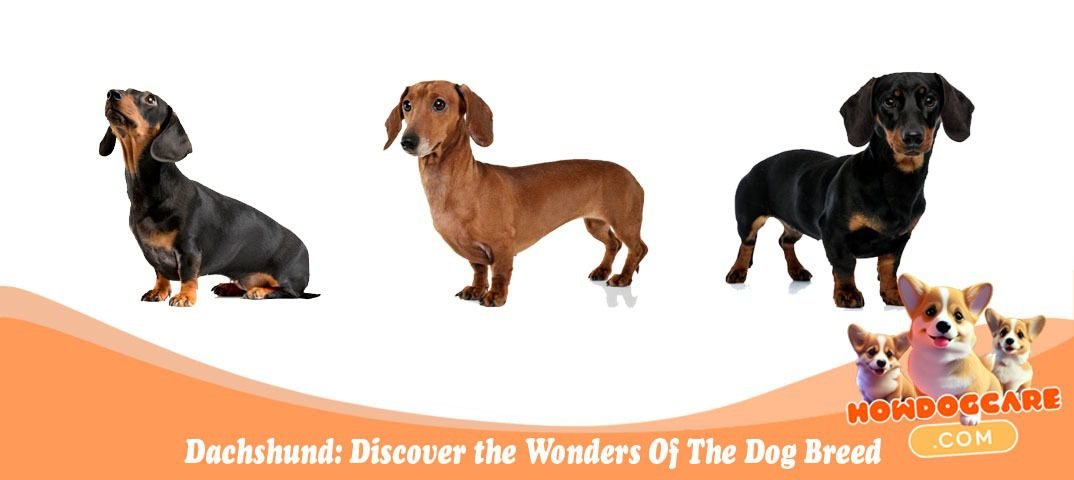In the vast tapestry of canine companions, the Dachshund dog breed stands out as a unique and spirited character. Revered for its distinctive elongated body, lively demeanor, and unwavering loyalty, the Dachshund has become a cherished companion for dog lovers worldwide. Join us on an illuminating journey as we explore the rich history, identifying characteristics, and the myriad reasons why the Dachshund is more than just a pet—it’s a delightful and loving member of the family.
Dachshund Dog Breed History
Origins in Germany:
The Dachshund’s roots can be traced back to 15th-century Germany, where the breed was initially developed for hunting purposes. The word “Dachshund” translates to “badger dog,” reflecting their original role in pursuing and burrowing into badger dens.
Evolving Roles:
Over time, Dachshunds diversified in size and coat varieties, adapting to various hunting needs. Their tenacity, agility, and keen sense of smell made them invaluable for tracking small game, including badgers, rabbits, and other burrow-dwelling creatures.
Transition to Beloved Companion:
As hunting practices evolved, Dachshunds found their way into the hearts of families. Their charming personalities and adaptability transformed them from skilled hunters to cherished companions, a role they excel in today.
Overview of This Dachshund Dog Breed
- Group
- Hound Group
- Origin
- Germany
- Size
- Small — long-bodied and low to the ground
- Height & Weight
- 5–9 in (13–23 cm); 11–32 lb (5–15 kg) depending on variety
- Temperament
- Clever, lively, courageous, and affectionate
- Lifespan
- 12–16 years
- Exercise Needs
- Moderate — daily walks and playtime are necessary
- Trainability
- Moderate — consistent training and patience required
- Health Issues
- Back problems (IVDD), obesity, dental issues
- Best For
- Families, apartment dwellers, and experienced dog owners
- Summary
- Dachshunds are spirited, clever, and affectionate dogs, famous for their long bodies and bold personalities, making them loyal and entertaining companions.
Identifying Characteristics

Distinctive Body Shape:
Dachshunds are characterized by their elongated body and short legs, a feature that sets them apart from other breeds. Their unique physique was originally designed to facilitate navigating burrows during hunting.
Three Coat Varieties:
Dachshunds come in three coat varieties: smooth, long-haired, and wire-haired. Each variety has its own appeal, from the sleek and shiny coat of the smooth Dachshund to the longer, flowing locks of the long-haired version and the rough and dense coat of the wire-haired Dachshund.
Size Variations:
Dachshunds are available in three sizes: standard, miniature, and kaninchen (rabbit). The standard size weighs between 16-32 pounds, while the miniature ranges from 11 pounds or less. The kaninchen, recognized in some countries, is the smallest variant.
Behavior and Temperament
Lively and Playful:
Dachshunds are known for their lively and playful nature. Despite their size, they carry a big personality and enthusiasm for playtime, making them wonderful companions for families and individuals alike.
Intelligent and Curious:
Dachshunds are intelligent dogs with a curious streak. Their inquisitive nature often leads them to explore their surroundings, and their problem-solving abilities showcase their sharp minds.
Affectionate and Loyal:
While Dachshunds may display independence, they are also affectionate and loyal to their owners. Forming strong bonds, they often become devoted members of the family, offering companionship and warmth.
Nutrition and Health Considerations
Dietary Requirements:
Dachshunds benefit from a well-balanced diet that suits their size and energy levels. Providing high-quality dog food and portion control is essential to maintain their overall health.
Spinal Health Awareness:
Due to their elongated bodies, Dachshunds are prone to spinal issues. Maintaining a healthy weight, avoiding excessive jumping, and using proper harnesses can contribute to spinal health.
Training and Care

Positive Reinforcement Training:
Dachshunds respond well to positive reinforcement training methods. Keeping training sessions engaging and rewarding helps channel their intelligence and eagerness to please.
Moderate Exercise Needs:
While energetic, Dachshunds have moderate exercise needs. Daily walks, interactive play, and mental stimulation activities contribute to their well-being without overwhelming their small stature.
Grooming Routine:
Grooming requirements vary based on the coat type. Smooth-coated Dachshunds need minimal grooming, while long-haired and wire-haired varieties may require more attention. Regular brushing, nail trimming, and dental care are essential aspects of their grooming routine.
Related Articles
Common Misconceptions Dispelled
Fragility Perception:
Despite their long body, Dachshunds are not fragile. With proper care and attention to their unique needs, they are robust and adaptable pets.
Stubborn Behavior Notion:
While they may display independence, Dachshunds are trainable. Consistent positive reinforcement and patient training can overcome any perceived stubbornness.
Choosing Dachshund as Your Companion, Reasons?
Compact Size for Apartment Living:
Dachshunds are well-suited for apartment living due to their compact size. Their adaptability to various living situations makes them ideal for urban dwellers.
Playful Family Member:
Dachshunds bring joy and playfulness to families. Their lively spirit and affectionate nature make them delightful companions for children and adults alike.
Varied Coat Options:
With three coat varieties, Dachshund enthusiasts can choose a pet that fits their grooming preferences. Whether smooth, long-haired, or wire-haired, each variety has its own charm.
Frequently Asked Questions (FAQs)
- Are Dachshunds good with children?
- Yes, Dachshunds are generally good with children, but early socialization and supervision are crucial. Their playful nature makes them delightful companions for families.
- Do Dachshunds require a lot of grooming?
- Grooming needs vary among coat varieties. Smooth-coated Dachshunds need minimal grooming, while long-haired and wire-haired varieties may require more attention. Regular brushing, nail trimming, and dental care contribute to their overall grooming routine.
- Are Dachshunds prone to back problems?
- Yes, Dachshunds are prone to spinal issues due to their elongated bodies. Maintaining a healthy weight, avoiding excessive jumping, and using proper harnesses can help prevent back problems.
- Do Dachshunds get along with other pets?
- With proper socialization, Dachshunds can get along well with other pets. Early introductions and positive interactions contribute to a harmonious multi-pet household.
- Are Dachshunds good apartment dogs?
- Yes, Dachshunds are well-suited for apartment living due to their compact size. Regular exercise, daily walks, and interactive play sessions fulfill their moderate exercise needs in smaller living spaces.
Conclusion: Dachshund – A Bundle of Charm and Character
In conclusion, the Dachshund dog breed embodies a delightful blend of charm, character, and loyalty. Whether you’re captivated by their distinctive appearance, playful antics, or affectionate nature, Dachshunds bring a unique joy to the world of canine companionship. If you’re seeking a small but spirited companion, the Dachshund might just be the perfect addition to your home—a bundle of charm, intelligence, and unwavering companionship ready to fill your life with love, laughter, and delightful moments.






